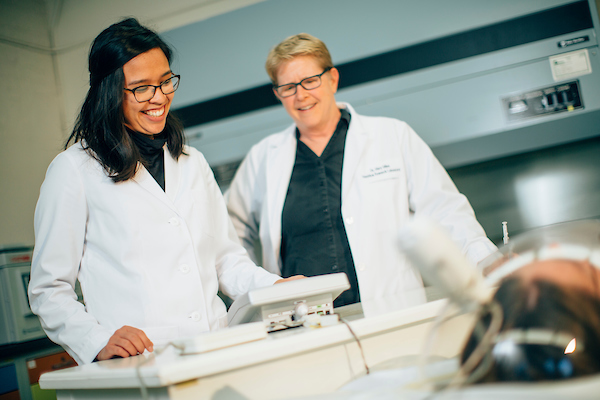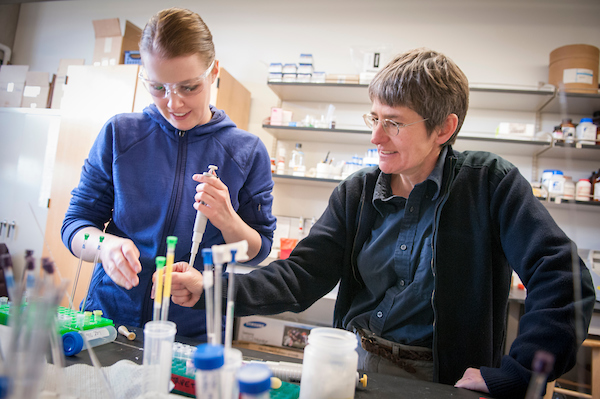Master of Science in Health Sciences


Master of Health Science
The Master of Health Science is an accelerated one-year program that empowers students to build a strong and versatile foundation in the health sciences. With three specialized tracks—Molecular Medicine, Community Health, and Health and Medicine—the program offers the flexibility to tailor studies to individual career goals. Because of the various tracks, the program supports educational endeavors in various healthcare topics, allowing for work under different content experts, preparing graduate-level deliverables. Intake for the Molecular Medicine and Health & Medicine options is currently for the fall term only. This program is a non-thesis master's, STEM-approved.
Track Options
Students can choose from three tracks* and select a focus area at the start of the application process.
- The Molecular Medicine track emphasizes core concepts in microbiology, immunology, and cellular function, with course options such as hematology, mass spectrometry, and cognitive neuroscience.
- The Health and Medicine track strengthens students’ understanding of preventive medicine through coursework in psychology, anatomy, and nutrition.
- The Community Health track builds a solid foundation in public health, equipping students to promote wellness and well-being within communities. This final track prepares students to gain a deeper understanding of community and public health, which is essential for those applying to health professions programs, such as medical school.If you are interested in a research-based community health program, you should review the Community Health, Master's.
If you have questions about the specific track, please direct them to:
- Molecular Medicine & Health and Medicine: Loren Gray, loren.gray@montana.edu
- Community Health: Brant Schumaker, brant.schumaker@montana.edu
*Applicants without a STEM degree or who need to take (or re-take) prerequisite courses should consider the Health Professions Post-Baccalaureate program as a pathway to the MS in Health Sciences.
Application Requirement & Pre-Requisite Requirement
- Applicants without a STEM undergraduate degree are recommended to have completed at least 1 year each of the following prerequisites: introductory biology, introductory physics, general chemistry, organic chemistry, and biochemistry.*
- Official transcripts from all universities and colleges attended (International applicants must have transcripts evaluated/transcribed by WES or a similar agency).
- 2 letters of recommendation.
- Statement of Health Care Interest.
NOTE: Applications are accepted for Fall and Spring terms:
- Fall: Applications are due between Sept 1 and August 1, for the following Fall term start only (international applicants need to apply 120 before the start of term).
- Spring: Applications are only accepted upon approval from a program leader.
Program Details
Some basics include:
- Minimum: 9 credits from Emphasis, 24 course credits, 3 scholarly project credits (HMED or CHTH 575, w/presentation); 30 credits total.
- Maximum: 9 credits from 400 level, 9 credits from transfer (UM, MSU-B), 6 credits (HMED or CHTH 575).
- Special courses: 491, 492, 588, and 589 credits do not apply. No limit for 595 credits. 592, 594, and 598 credits cannot constitute more than 1/3 of total credits. HMED 540 Clinical Practicum HMED or CHTH 575 Scholarly project, and HMED 594 Journal Club apply to each Emphasis.
- The course listing serves as an example of potential opportunities. Access to any given course will depend on availability and completion of appropriate prerequisites. There is no guarantee that any particular course will be offered or available.
- With limited exceptions, this program is offered fully in person and is intended (but not required) to be completed within two semesters or one year.
Funding
As with many graduate programs, graduate students can pursue financial aid or scholarships. This program has a limited number of graduate teaching assistantships (GTA), so students applying to this program should be prepared to fund their own education.
Possible GTA courses include:
- BIOH 201/366—Anatomy and Physiology I
- BIOH 211/371—Anatomy and Physiology II
- BIOB 260—Cellular and Molecular Biology
- BIOM 360—General Microbiology
Please reach out to Loren Gray with inquiries regarding a GTA appointment for these courses.
Core Focus: Strengthens students’ understanding of the core concepts of microbiology, immunology, and cellular functions.
| BCH 441 | Biochemistry of Macromolecules | 3 |
| BCH 442 | Metabolic Regulation | 3 |
| BCH 444R | Biochemistry & Molecular Biology Methods | 3 |
| BCH 524 | Mass Spectrometry | 3 |
| BCH 543 | Proteins | 3 |
| BIOB 410 | Immunology | 3 |
| BIOB 425 | Adv Cell & Molecular Biology | 3 |
| or BIOB 525 | Adv. Cell & Molecular Biology | |
| BIOB 524 | Ethical Practice of Science | 3 |
| BIOH 405 | Hematology | 3 |
| BIOH 422 | Genes and Cancer | 3 |
| BIOH 511 | Advanced Human Anatomy | 4 |
| BIOH 445 | Introduction to Pharmacology | 3 |
| BIOH 465R | Gene Expression Lab: From Genes to Proteins to Cells | 3 |
| or BIOH 565 | Gene Expression Lab: From Genes to Proteins to Cells | |
| NEUR 435 | Cognitive Neuroscience | 3 |
| NEUR 455 | Molecular Medicine | 3 |
| BIOM 400 | Medical Microbiology | 3 |
| BIOM 425 | Toxicology: Science of Poisons | 3 |
| or MB 527 | Toxicology | |
| BIOM 431 | Medical Bacteriology | 3 |
| BIOM 441 | Eukaryotic Pathogens | 4 |
| BIOO 412 | Animal Physiology | 3 |
| EMEC 424 | Cellular Mechanotransduction | 3 |
| HSTR 417 | Early Modern Science | 3 |
| HSTR 419 | Modern Science | 3 |
| IMID 501 | Exper Immunology/Pathology | 3 |
| IMID 505 | Gene Regulation in Human Development, Disease, and Immunity | 3 |
| MB 505 | Host-Associated Microbiomes | 4 |
| MB 520 | Microbial Physiology | 3 |
| MB 525 | Advanced Immunology | 3 |
| MB 528 | Advanced Genetics | 3 |
| MB 530 | Virology | 3 |
| BIOH 509 | Advanced Human Torso Anatomy | 4 |
| HMED 575 | Professional Paper and Project | 1-4 |
| HMED 540 | Clinical Practicum | 1 |
| HMED 594 | Seminar | 1 |
Core Focus: Provides a foundation for understanding community health with a focus on advancing public health and promoting the well-being of communities related to health care administration, education, non-profit, government, or other community health organizations and settings.
| AC 502 | Psychopharmacology (Sp) | 3 |
| AC 504 | Alcohol and Drug Studies (Fa) | 3 |
| CHTH 405 | Caregiving & Aging Families | 3 |
| CHTH 430 | Mental Health & Soc Iss in Ag | 3 |
| CHTH 435 | Human Response Stress | 3 |
| CHTH 502 | Theories and Models in Health (Fa) | 3 |
| CHTH 575 | Paper-Project | 1-6 |
| HADM 445 | Managing Healthcare Orgs | 3 |
| HDCO 554 | Develop Across Lifespans (Sp) | 3 |
| HDCO 563 | Multicultural Awareness (Fa) | 3 |
| HDFS 545 | Contemporary Family Issues (Sp) | 3 |
| HTH 455 | The Ethics of Care (Fa) | 3 |
Total: 30 Credits
Substitutions with approval from the HDCH advisor - Dr. Brant Schumaker.
Core Focus: Emphasizes anatomy, nutrition, and psychology to provide students a better understanding in preventive medicine for their professional journey in either professional health schools, advanced graduate study, or employment.
|
Course |
Title |
Credits |
|
Required Curriculum: |
||
|
Clinical Practicum |
1 |
|
|
Professional Paper & Project |
1-6 |
|
|
Choose one course from the following: |
||
|
Advanced Cell and Molecular Biology |
3 |
|
|
Microanatomy (Histology) |
3 |
|
|
Advanced Human Anatomy - Torso |
4 |
|
|
Advanced Human Anatomy - Appendicular |
4 |
|
| CHTH 435 | Human Response to Stress |
3 |
|
Macronutrient Metabolism |
3 |
|
|
Micronutrient Metabolism |
3 |
|
| Exercise Metabolism and Health | 3 | |
|
Elective Curriculum (19-23 Credits): |
||
|
Evolution |
3 |
|
|
Advanced Cell & Molecular Biology |
4 |
|
|
Advanced Human Anatomy - Torso |
4 |
|
|
Advanced Human Anatomy |
4 |
|
|
Microanatomy (Histology) |
3 |
|
|
Animal Physiology |
3 |
|
|
Mental Health & Social Issues in Aging |
3 |
|
|
Human Response To Stress |
3 |
|
|
Principles of Epidemiology |
3 |
|
|
Exercise and Chronic Disease |
3 |
|
|
Seminar |
1 |
|
|
Exercise Performance and Nutrition |
3 |
|
|
Graduate Exercise Physiology |
3 |
|
|
Adv Physio/Pathophysiology |
4 |
|
|
Advanced Pharmacology I |
2 |
|
|
Health Care Informatics |
3 |
|
|
Nutrition for Sports/Exercise |
4 |
|
|
Macronutrient Metabolism |
3 |
|
|
Micronutrient Metabolism |
3 |
|
|
Exercise Metabolism and Health |
3 |
|
|
Nutrition for Fitness/Perform |
3 |
|
|
Social Cognition |
3 |
|
|
Science of Psych Well-Being |
3 |
|
|
Cognitive Processes |
3 |
|
|
Social Psychology |
3 |
|
|
Social Cognition |
3 |
|
Total: 30 Credits
Students interested in pursuing a career in post-secondary education may apply 12 credits the College Teaching Certificate toward their program.
Substitutions with consultation and approval of program chair.
